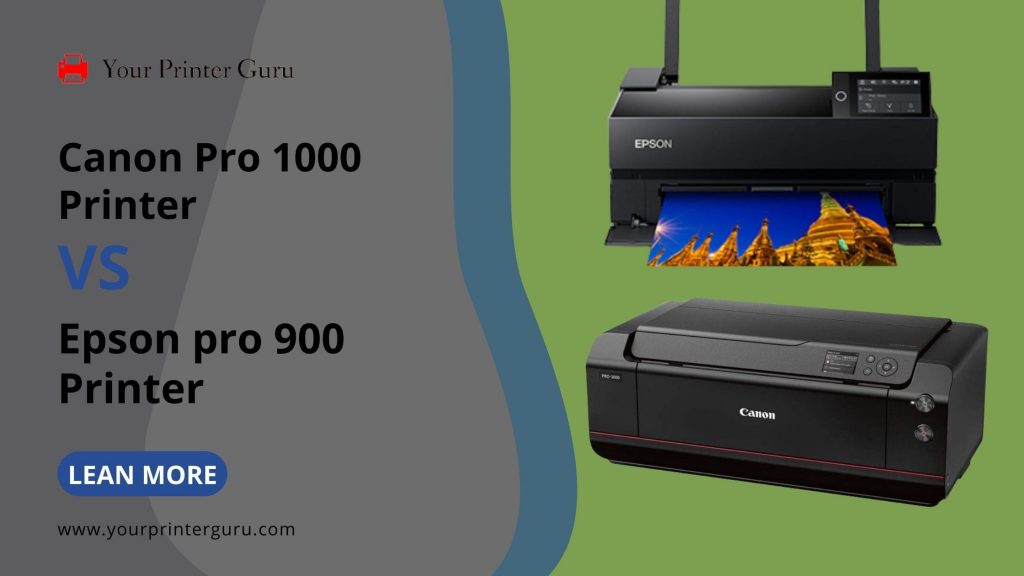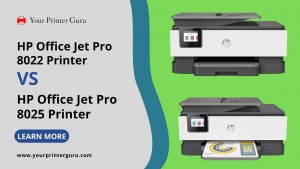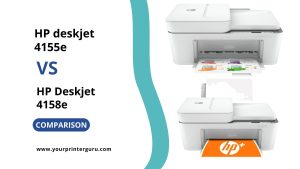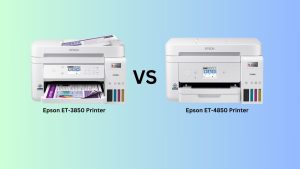Canon Pro 1000 Vs Epson Pro 900- Choosing a printer for your needs has always been a traumatic decision one has ever made. Although you need to consider all your needs, and requirements and most importantly you have to know all the traits first, only then you can choose the correct one.
A poor choice of printer can cause you an extra bunch of money for repairing, machinery and many other unnecessary debts.
There are many companies around the world selling printers, but there are two companies that are very much consistent in their fine art making printers i.e. Epson and Canon.
So, let’s compare the two most well-known A2 photo printers i.e. Canon pro-1000 and Epson pro 900. Both of them look kind of the same in many aspects but there are some crucial differences also. Let’s see them accordingly.
Difference Between Canon Pro 1000 and Epson Pro 900
| Feature | Canon Pro 1000 | Epson Pro 900 |
|---|---|---|
| Design and Build Quality | 3-inch color LCD, approx 32 kg weight | 4.3-inch touch screen, lightweight |
| Connectivity | Ethernet, Built-in WiFi, USB 2.0, mobile app | Hi-speed USB 3.0, Ethernet, WiFi, wireless |
| Printer Quality and Speed | Wide color effect, 4 mins for 17×22″ print | Vibrant color contrast, quicker print times |
| Number of Inks | 11 inks, Chroma optimizer | 10 high-quality inks |
| Connectivity | Ethernet, Built-in WiFi, USB 2.0, mobile app | Hi-speed USB 3.0, Ethernet, WiFi, wireless |
| Printing Cost | Higher cost per page, excellent quality | Lower cost per page, high-quality images |
| Page Yields | Varies for different inks | High page yields, more cost-effective |
| PRICE | CHECK OFFER PRICE ON AMAZON | CHECK OFFER PRICE ON AMAZON |
Canon Pro 1000 Vs Epson Pro 900 Comparison

Design and build quality:
While Epson is known for making the printing experience smooth and easy, Canon is mainly focused to get the best out of the photos. Both of these two printers have the best designs and quality as per the specs.
Canon Pro 1000 comes with a 3 inch color LCD with a bit heavyweight i.e. approx 32 kg. Whereas Epson Pro 900 has a 4.3-inch touch screen display and is more lightweight than the canon pro-1000.Canon Pro 1000 supports Apple Inkjet, Canon print Inkjet, Pixma printing solution, etc.
On the other hand, Epson pro 900 supports Google cloud, and Apple Airprint and also has Wifi direct to print. The operating system both supports Windows and Mac OS.
Epson ensures Adobe Photoshop is plus quality and the software is itself a vital advantage for Epson 900. Also, the control panel has such a superior grade that will buy you the best of it.
Printer quality and speed
The Canon Pro 1000 is mainly focused to enhance the printing experience to another level. The specialized software system and the 11-plus ink Chroma optimizer create the widest and most vibrant color effect and make your print extraordinary. Moreover, the speed of its print timing is quite decent. The Canon pro-1000 takes 4 mins to print 17×22”printings.
And the Epson p900 takes less time 1minute 29 secs for 8×11”print and 2 mins 30 secs for 13×19” printings. The decent head print creates tubular ink in the entire delivery system.
It generates a faster print which also reduces the problem of clogging. A set of 12 specific cartridges are provided along with the printer which maintains the color consistency on the paper.
On the other hand, Epson p900 creates exclusive images and artwork. The printer works great in borderless printing in which the deep black works great with its ten more high-quality inks.
The color contrast of the device is really impressive and must say for using household or professional uses it will run the best. It can print 17 by the 22-inch cut sheets which is really impressive in many aspects. It only takes a few minutes to create such a beautiful wonder.
Connectivity features
Connectivity is the most important issue when it comes to the uses of a printer. Canon Pro 1000 has an access to Ethernet, Built-in WiFi with USB 2.0.
Also, it’s very mobile friendly you can use it by downloading the Canon’s Print app on your mobile, and via connecting Wifi, you can easily get your photos printed.
The printers also offer you to use Pixma cloud link, which is indeed a very necessary thing for using the documents from nay cloud-based servers.
In the case of Epson 900, it has also almost the same qualities like Hi-speed USB 3.0, Ethernet, direct WiFi, 2.4 and 5 GHz wireless. Also supports Wifidirect, google cloud print, and the Epson layout printing for printing quality photos through the iOS system.
Printer cost and page yields
While purchasing a printer is worth money, the idea of per print cost comes to our mind without fail. To be honest, the Canon pro-1000 is a bit costly in its printing, but it gives you the best quality print indeed.
The page yield of the Canon pro-1000 is A2 photos matte black (1600 photos) and black photo (256 photos). In Epson pro 900 page yields are more than canon 1000. The cost of per page printing in Canon pro 1000 is 0.22 US $per page for 4×6” pages and for 11×16”its 1.4 US $ per page print cost.
Comparatively, the output Epson Pro 900 stands out to be justified, the cost per print is 0.17 US $per page and for 11×14” 1.08 US $ per page.
Whereas, Epson pro 900 delivers you a vibrant and well-spaced printing text at a low running cost. Its high texture black color tinge is great. But the cost of the ink is a bit high.
Conclusion– Canon Pro 1000 Vs Epson Pro 900
Both the printers are with good specifications and moderate performance. The main con of Epson 900 is that if you don’t use this on a regular base it can lead to a clogged nozzle.
But in the Canon pro-1000, you will find an anti-clog system that will help to keep the printer anti–clogged while it’s not used. Both of them deliver 17-inch wide-angle photos.
Although the best choice can’t be determined it’s all up to your needs, requirements, and desire. Hope these pieces of information will help while making decisions.



